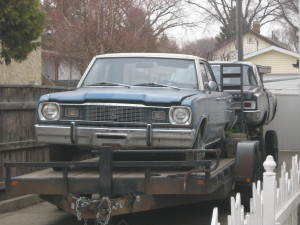Eight Critical Tips for Classic Car Restoration
By joe89g45ne

By dave_7 from Lethbridge, Canada (Project Cars – Plymouth Valiant) [CC BY-SA 2.0 (http://creativecommons.org/licenses/by-sa/2.0)], via Wikimedia Commons
1. Know your budget.
Auto restoration can quickly eat a hole in your pocket if you’re not careful. Before you ever decide on a make and model, determine how much you can afford to spend. When you negotiate with a seller or dealer, stick to your budget – and don’t be swayed by the allure of a specific car.
2. Plan for future costs.
Even if you buy a car in decent shape, you may still end up spending more on repairs and replacements than on the automobile itself. Think about the parts you’ll need, the time you’ll spend, and the professional services you’ll require. You may also want to consider resale value, though most enthusiasts aren’t looking to make a profit.
3. Find an appraiser.
Even honest car salesmen don’t always know the right prices. It’s well worth the additional cost to get an appraiser to determine the value of your potential purchase. Cars that appear well-maintained may actually have internal damage or faulty parts. You’ll also want to verify the vehicle’s correctness and originality.
4. Check for rust.
Rust is the greatest threat to your car’s appearance and safety. It can tarnish the exterior, wreck the framework, and allow noxious fumes to enter the cabin. You can fix small patches of rust yourself with special soaking chemicals – but large jobs are best left to the professionals. This is one job you can’t afford to botch.
5. Learn about bodywork.
If your classic car has large dents or deformations, you’ll probably need to take it in for repairs. However, you may be able to fix small imperfections on your own. Most automotive stores carry easy-to-use fiberglass kits, and basic welding equipment will allow you to make minor repairs to steel. Learning how to finish these small tasks will allow you to save money for important professional work.
6. Shop in the right region.
Weather conditions have dramatic impacts on the longevities of automobiles. Colder areas subject them to snow, sleet, and ice, all of which can cause irreparable rust. On the other hand, dessert environments contain far too much sand, dirt, and other erosive debris. Temperate states like Florida provide the best environments for purchasing, repairing, and storing classic cars.
7. Store your car properly.
When you’re not driving or working on your car, it’s crucial that you store it properly. Reserve your garage space for your restoration projects, and control the temperature and humidity if possible. If you have to stow your project for several months, make sure you add new brake fluid and drain both the fuel tank and cooling system.
8. Find qualified professionals.
Chances are you’ll need some professional work to fully restore your car. Even the most knowledgeable enthusiasts usually lack the equipment and experience for paint jobs, bodywork, and large-scale rust removal. When you do need to bring your car in, make sure you work with the best and most experienced mechanics.
